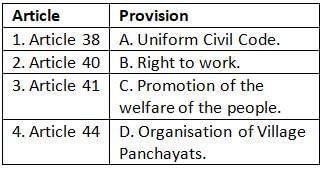Test: Directive Principles of State Policy - 2 - UPSC MCQ
15 Questions MCQ Test Indian Polity for UPSC CSE - Test: Directive Principles of State Policy - 2
Which of the following is NOT a difference between fundamental rights and directive principles?
In which case did the Supreme Court highlight the unenforceable nature of directive principles?
Which Amendment Act introduced Article 31C to protect a law seeking to implement a directive under 39 (b)-(c) from being declared ultra vires on the ground of contravening?
Which case upheld the validity of the 25th Amendment Act?
Which case foiled the attempt to accord primacy to the directives over fundamental rights?
What is the principle that courts should adopt when a law is challenged as constituting an invasion of the fundamental rights specified in Articles 14, 19, or 31?
Which Directive is NOT included in Part IV of the Constitution but is still given attention by courts?
Which Article of the Indian Constitution primarily promotes the welfare of people by securing a social order?
The Directive Principles of State Policy are influenced by which of the following?
Which Article provides that the State shall endeavor to promote international peace and security?
Which Directive Principle is concerned with the organization of village panchayats?
Which amendment expanded the scope of the directive principles under Article 31C?
Which Article of the Indian Constitution provides for early childhood care and education for children up to the age of six?
Which Article aims to promote equal justice and provide free legal aid to economically weaker sections?
|
145 videos|630 docs|203 tests
|





















